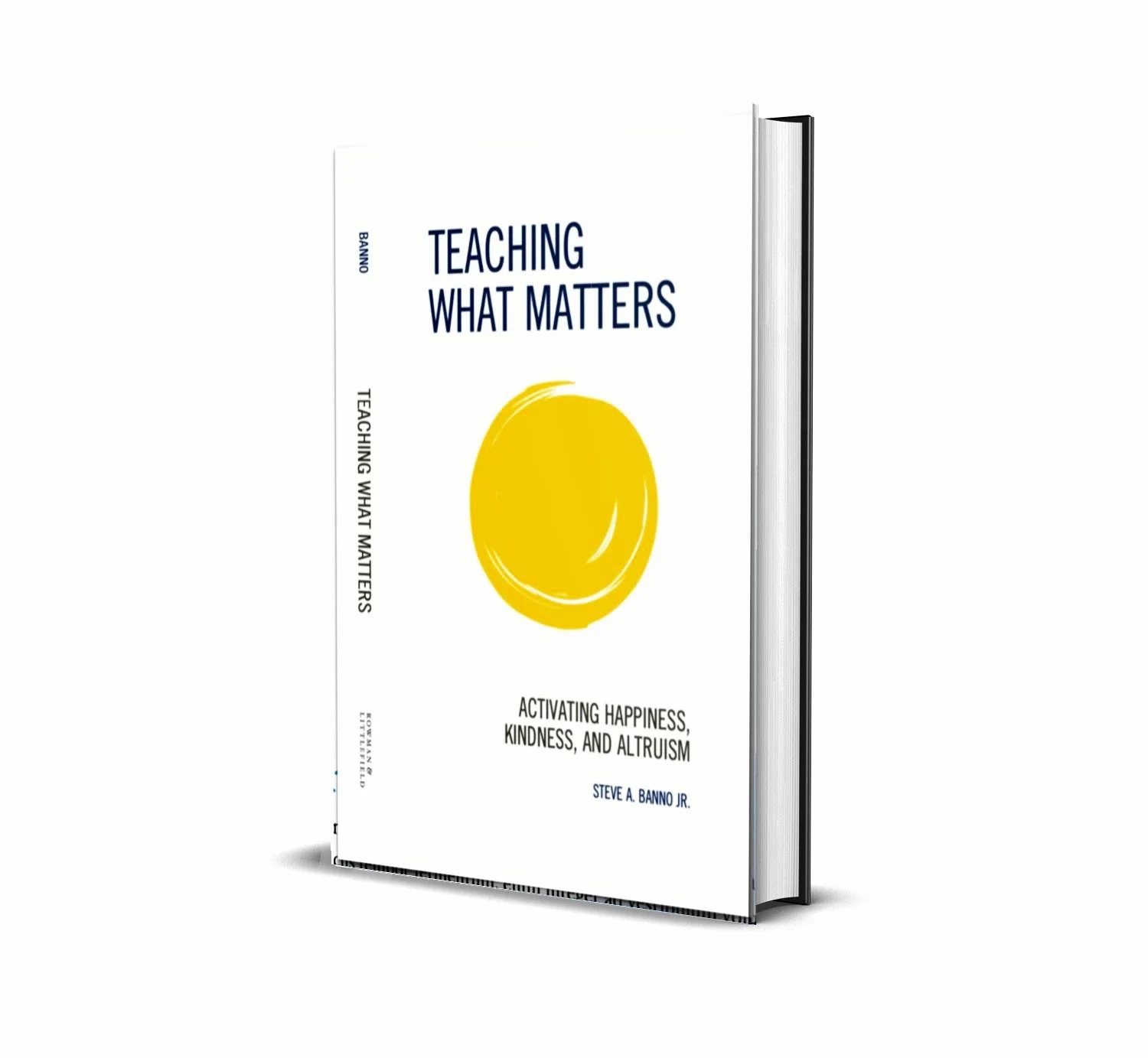Teaching What Matters: Activating Happiness, Kindness, and Altruism
A transformative guidebook that includes a variety of specific activities and reflections designed to help students explore and internalize concepts related to happiness, kindness, and altruism. This book offers a curriculum guide that goes beyond traditional academic subjects to address fundamental aspects of human well-being and social interaction. This approach can help prepare students not just for academic success, but for leading fulfilling and meaningful lives.
“What does it mean to be educated? ‘Knowing how to be happy’ may not be a common response to this question. Yet, happiness is what we all seek in life. Steve Banno, Jr., provides a blueprint for educators and those who work with youth on how to teach the “soft skills” of success in life: happiness and altruism. This book expertly intertwines the science of happiness, educational research, personal experience, and suggested lessons to provide a strong argument for teaching happiness in primary and secondary schools. Banno illustrates a different model for education than the model currently provided by the academic industrial complex. Teaching What Matters helps those of us who have thought, “I wish someone had taught me this earlier,” put words into action by teaching the next generation the true meaning of success.””
“Steve Banno, Jr. has written a groundbreaking book for educators that will surely transform the lives of their students. In Teaching What Matters he skillfully and comprehensively integrates what we know from Positive Psychology about how to live a happy and meaningful life and translates it into a ready-made course that may be the most impactful course one ever teaches. Through his careful weaving together of evidence-based research with thoughtful activities and reflections that invite students into hands-on experiences, the course laid out in this book inspires the best in students and empowers them to discover for themselves what it means to live an authentic, valued, and meaningful life.”
“In a world of endless access to infinite data, we need to free teachers to do what they set out to do in the first place-help us raise connected, engaged, and healthy children.”
“There is a lot of heavy lifting in education. One of the biggest challenges is helping students grow into their true potential. Steve has created a practical classroom guide to doing exactly that. This book will help focus on what truly matters, enabling students not only to be successful but to make the world a better place.”
“I looked over this curriculum and can truthfully say, “Good job!” I cannot believe how much work has been done. I think the content is powerful and something all school systems need!”
— KATHY DELANEY-SMITH,
retired 40-year Women’s Basketball Coach, Harvard University
“The authors’ six principles articulate a new vision for how to transform the way in which sports transforms lives. The activities show exactly how to feasibly make this happen and then the Assess for Success Scorecards ensure you will keep on track in a spirit of continuous improvement. This curriculum should be required reading for all teachers, coaches and students involved with high school sports and preparing our young people for the tests of life.”
— MAURICE J. ELIAS, PH.D.,
Rutgers University, Co-Director, The Academy for SEL in Schools, Board President, SEL4US.org
“This innovative and well-researched curriculum for middle and high school sports teams is unique because it addresses hate and bias early in a young athlete’s life. It gives guidance on how to conduct difficult conversations, to understand one’s own identity and to see our differences and commonalities by setting out multiple ways of approaching these topics.
As Nelson Mandela said, ‘Sport . . . has the power to unite people in a way that little else does.’ I believe this curriculum moves his vision forward by giving young people concrete examples on how to digest the complexities of living in America today and then taking action to make it better for all.”
— RICHARD LAPCHICK, PH.D.,
Often called the “racial conscience of sports,” Founder of Northeastern University’s Center for the Study of Sport in Society, Director at the University of Central Florida, The Institute for Diversity and Ethics in Sport (TIDES), President, Institute for Sport and Social Justice.


